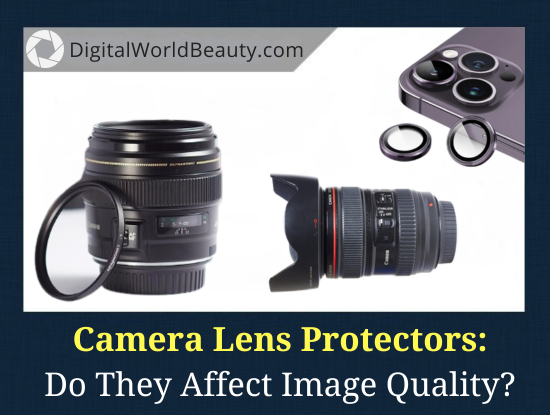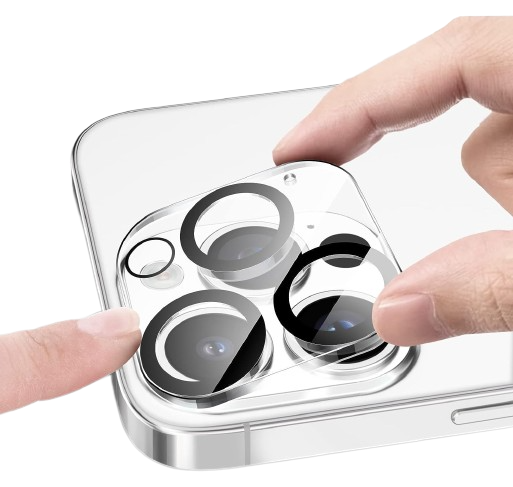Please note: As an Amazon Associate I earn from qualifying purchases. I also work with other affiliate partners and may be compensated from the links below. Details here.
Does a Camera Lens Protector Affect Picture Quality? Are They Worth It? [Answered]

Look:
A lens protector fits snugly on top of your camera glass to add a protective barrier between the delicate glass and the outside world. Photographers use them to extend the life of their camera lenses.
But when used incorrectly, they can impact picture quality.
While these little accessories are designed to protect and enhance your camera’s potential, the wrong one can do more harm than good.
Whether you’re a professional photographer or part-time hobbyist working on developing your style, chances are you’ve considered investing in a camera lens protector.
And that’s exactly what we’ll talk about today.
Specifically:
- Does a camera lens protector affect image quality?
- What is the purpose of the camera lens cover?
- Should we use camera lens protector?
- The pros & cons of using them
- Lots more
Without further ado, let’s get started.
What Are Camera Lens Protectors?
So, what is the purpose of the camera lens cover and how do they work?
Camera lens protectors are round, flat caps that can be fitted on top of a camera lens to protect it from dust, moisture, grit, scratching, and harsh UV light.
You can find them at most camera equipment stores in a variety of different shapes, forms, and materials. The most popular ones include:
-
UV filters
Made of tempered glass, these ultraviolet light filters protect your lens from degradation from the sun. They remove haze from your photos and can improve sharpness. They also act as a shield to protect against dirt and moisture.
-
Lens hood
Instead of being positioned directly on the lens, a lens hood acts like a baseball cap that sits on the top of your lens design. This helps to protect your lens from unwanted light glares, rain, snow, or any swirling debris that may be in the air.
-
Lens cap
While not exactly the topic of this conversation, it’s still worth mentioning since it’s also a type of lens protector.
When not in use, a camera glass should still be protected, and that’s what a lens cap does.
Able to screw onto the front of your lens, this cap serves as a solid plastic shield that keeps your camera safe and clean. However, due to being solid black, you cannot use a lens cap while taking photos, it’s for non-active use only.
All of these options can be very useful for protecting your camera lens and keeping your camera in great condition for a long time.
So why the controversy?
Let’s look at some pros and cons.
Using Camera Lens Protectors: Pros & Cons
There are many factors to consider when it comes to camera lens protectors.
They can help to keep your glass in good condition and prevent damage from occurring. However, they may negatively impact the quality of your captured images.
For the sake of a balanced perspective, let’s take a look at the various pros and cons of using a camera lens protector on your camera.
Pros
-
Reduces lens damage
A naked camera lens is vulnerable to scratches, fingerprint smudges, dust accumulation, moisture damage, and a whole lot more. But the right protector can significantly reduce the exposure and impact of these issues.
-
Extends the life of your camera
By protecting your lens, you protect the whole camera and extend its life. This will mean you get better, longer wear out of your camera, and if you do ever decide to sell, you’ll get a fair price.
Cons
-
Can add a yellowed tinge to images
Some UV protectors can add a yellow tinge to your images, thus compromising the natural hue of the shot.
-
May cause blurriness
If your lens protector is made from anything other than tempered glass (such as plastic), it can make your pictures appear hazy or blurry.
-
Can create a glare
If the light hits your lens protector in a certain way, it can cause a glare to develop.
So…
Despite these significant “cons” to using a camera lens protector, it’s crucial to note that these negative impacts are almost always a result of two things: poor quality lens protectors or improperly installed ones.
Many photographers wonder whether a camera lens protector is good or bad, and the answer largely depends on the quality and proper installation.
Some users also worry does camera lens protector damage camera, but quality protectors actually prevent damage rather than cause it.
By buying a high-quality lens protector and learning how to install or use it properly, there’s no reason to be afraid of impaired picture quality.
What About iPhone Lens Protectors?
iPhone photography has risen to mainstream popularity over the past few years.
As each new generation of smartphone becomes increasingly more powerful and sophisticated, some of the world’s best photographers use iPhones nowadays, even for professional shoots around the world.
As smartphones become more sophisticated, users frequently ask does iPhone lens protector affect picture quality.
Just like with traditional cameras, the impact depends on the protector’s quality and proper installation.
Alsom iPhone camera lenses also need to be protected from the elements.
iPhone lens protectors are arguably just as if not more important than regular lens protectors because the device is multi-use, meaning you get more wear out of it during the day and potentially expose it to many more forms of dirt, moisture, or UV light.

There are a few ways to decide if it’s worth it for you to invest in one of these tools. You should buy an iPhone lens protector if:
-
You frequently use your iPhone to take pictures
Regular use means a much higher likelihood of scratches, smudges, or dirt buildup, which will negatively impact the quality of your images. If you are an avid iPhone photographer, buying a protector is an investment.
-
You plan on reselling your iPhone in future
If you want a fair price for your used iPhone, the lens needs to be in great working condition.
-
You value keeping your iPhone in peak condition
Whether you intend on selling your iPhone or not, keeping its lens in mint condition is the smart thing to do.
This being said, you might want to consider iPhone lens protectors.
Are Lens Protectors Worth It?
Camera lens protectors are worth it if you’re a professional or avid photographer who wants to extend the life of your camera and keep the lens quality intact.
They’re an especially good investment if you’re shooting images for your photography portfolio and are spending a lot of time traveling from shoot to shoot, or if you regularly shoot on locations.
However, it’s only really worth it if you can afford to invest in a high quality one that will fit snugly on your lens and retain transparency over a long period of time.
If you are only able to buy a lower-end one, you could end up actually damaging your lens, thus negatively impacting the quality of your photos by way of color obfuscation or blurriness.
If you’re desperate to protect your camera lens but don’t have the funds for a good one at present, you can minimize potential damage by only leaving your protector on during travel and being very careful about how you position it on the lens.
Should You Use Camera Lens Protectors?
Does camera lens protector affect image quality?
Yes, a camera lens protector can affect picture quality. Whether positively or negatively, it depends.
Cheap or poorly installed covers can cause your photos to become slightly blurry, yellowed, or skewed. But high quality, properly fitted ones should not have this effect.
A good quality camera lens comes with many benefits.
It keeps your lens clean, smooth, and in the best condition possible, allowing you to produce much clearer shots that are better quality overall. So if you can invest in a good lens protector, you should.
There are lots of different types of lens protectors to choose from—UV filters, lens hoods, and lens caps. However, all of them perform a similar function: to protect the lens.
If you’re in a position to purchase a good-quality camera lens, it’s worth the investment. Just make sure you buy the right one for your camera (or iPhone) and learn how to install it without compromising the quality of your images.
When evaluating are camera protectors worth it, consider your shooting style and environment.
Also remember that knowing how to remove camera lens protector properly is important for maintenance and upgrades.
Now, we’d like to hear from you:
- What’s your opinion of this photography accessory?
- Are camera lens protectors worth it, in your opinion?
Share your thoughts in the comments below!
